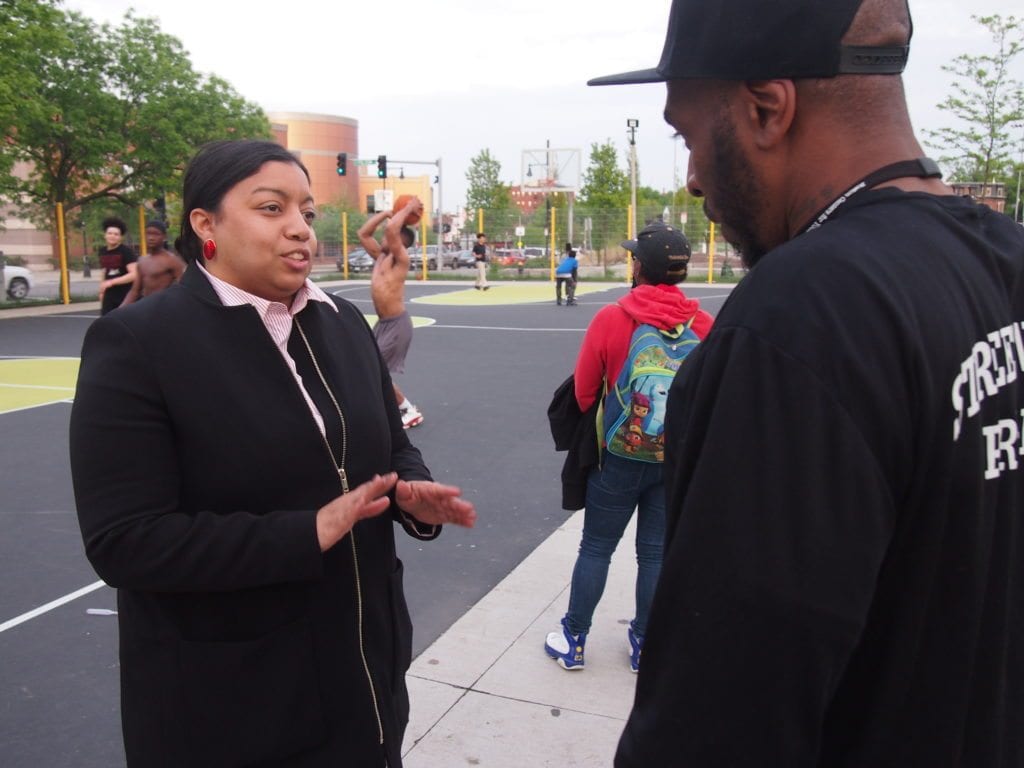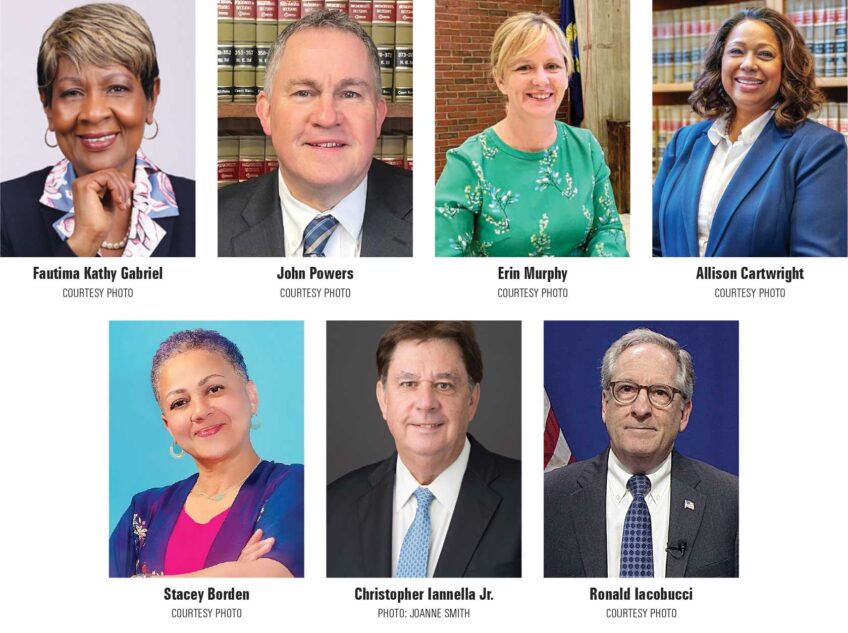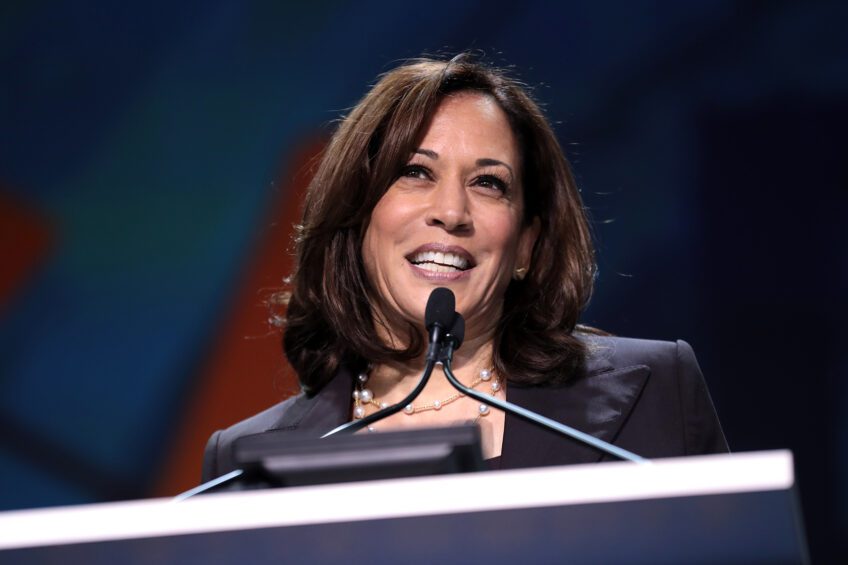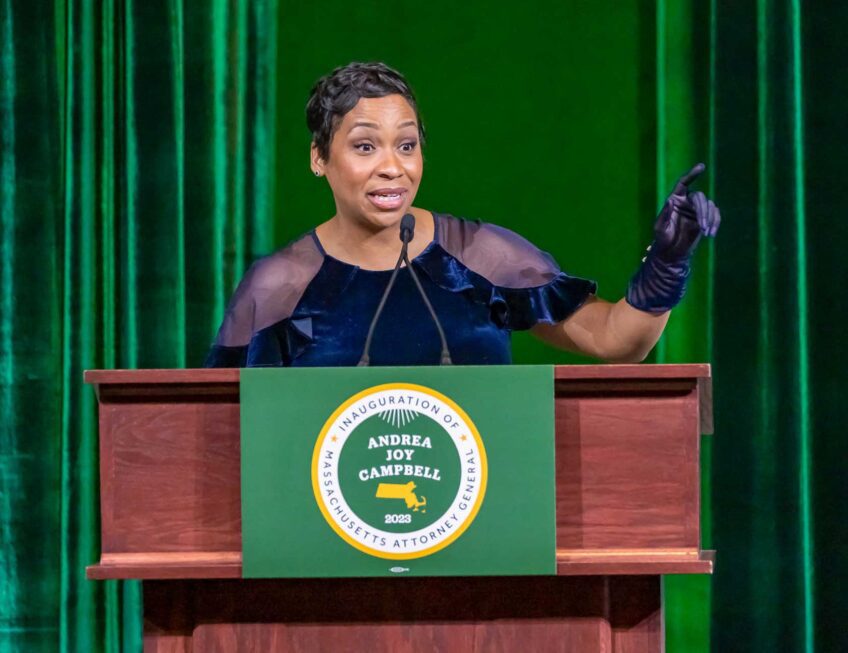Howell, Miranda go head-to-head in 5th Suffolk race
Candidates gear up for competitive campaign season

Walking through Dorchester’s Mary Hannon Park last Friday, 5th Suffolk District candidate Liz Miranda hands out campaign literature. As she chats with street worker Jamal Wornum, a group of elementary, middle and high school students play basketball as part of the informal summer program he runs when he’s not working for the city.
Miranda discusses possible funding sources Wornum could tap to get the help he needs to enroll more students in his basketball league.
A few blocks over, on Woodbine Street, 5th Suffolk District candidate Darrin Howell knocks on doors. He chats with retiree James Johnson about the cars that speed from Warren Street to Blue Hill Avenue, using his block as a cut-through. Couldn’t the city provide speed bumps here, as they have on streets in Jamaica Plain?

James Johnson chats with Darrin Howell.
“We pay taxes,” Johnson says. “Why can’t our area be like other parts of the city?”
Howell tells Johnson he’ll put him in touch with the Mayor’s Office of Neighborhood Services and takes down Johnson’s number, pledging to follow up with him.
In their one-on-ones with potential voters, both candidates are showing skills they could bring to the 5th Suffolk District seat.
Howell, a union organizer and aide to former City Councilor Chuck Turner, brings a laser focus to constituent services and a passion for social justice issues.
“Gentrification is real in this district,” Howell says. “There’s a lack of access to jobs with a living wage.”
Miranda, executive director of the Hawthorne Youth and Community Center in Roxbury and a lifelong resident of the district who cut her teeth as a youth organizer, has worked extensively in the nonprofit sector and has deep ties to the district’s black and Cape Verdean communities.
“This district is made up of little communities,” she says. “This district needs a coalition-builder to form a bridge between these communities.”
The two candidates will face off against perennial candidate Roy Owens in the Sept. 4 Democratic primary. The victor will share the Nov. 6 ballot with independent candidate Althea Garrison.
The 5th Suffolk District includes parts of the Dudley Street neighborhood, the Moreland Street section of Roxbury and parts of Fields Corner, Bowdoin Street and Meetinghouse Hill in Dorchester. It includes pockets of poverty and part of the proposed Dot Block development, a planned 362-unit market-rate housing complex that some neighborhood residents fear will drive up rents and hasten displacement of longtime renters in the area.
Miranda, a graduate of Wellesley College, says she has raised more than $13,000 for her campaign so far. Howell says he’s raised more than $5,000 and has endorsements from SEIU 1199, the Greater Boston Labor Council and United Steelworkers Local 8751, which represents Boston school bus drivers.
Low-turnout race?
These early voter contacts Miranda and Howell are making in the Dorchester-based district could be key to winning the preliminary contest in September. With the primary occurring the day after Labor Day, turnout is expected to be low, and contact with frequent voters could make all the difference.
Since the 5th Suffolk was redrawn in the early 1990s as a majority-people-of color-district, those who have represented it include Nelson Merced; Althea Garrison, who bested Merced in 1993 on a technicality; Charlotte Golar Richie, who bumped Garrison in 1995; Marie St. Fleur; Carlos Henriquez; and Evandro Carvalho.
Carvalho, who is leaving the role to run for the Suffolk County District Attorney seat, won the seat during a seven-way special election primary in 2014 with just 961 votes — 49 percent of the 1,959 ballots cast. In the general election that November, he beat challenger Althea Garrison with 739 votes. With such historically low turnouts, it’s the handful of frequent voters in the district who matter most. Now, both Howell and Miranda are targeting those high-frequency voters with aggressive door-knocking campaigns.
Howell, who has lived in the district four years, says the work of a legislator is an extension of the organizing work he’s done on issues ranging from the Fight for $15 campaign to raise the minimum wage to the push to reform the state’s criminal justice laws.
“I feel like I could be more effective as an elected official,” he says.
Miranda says her lifetime of advocacy in the district gives her an edge as she appeals for votes.
“I’m seeing lots of people I know,” she says. “I’ve had people stop me in the street and give me encouragement. It’s been affirming for me.”







